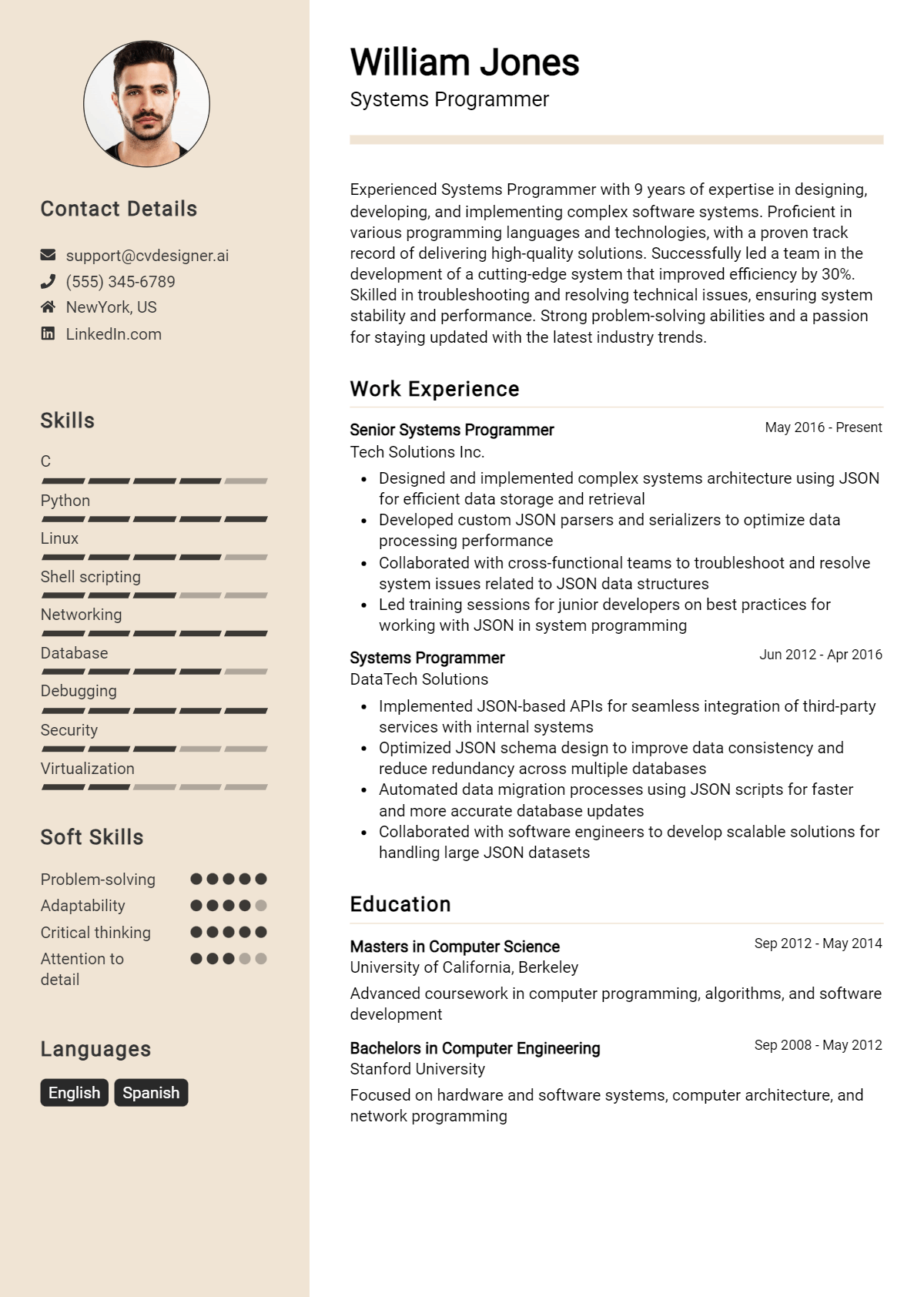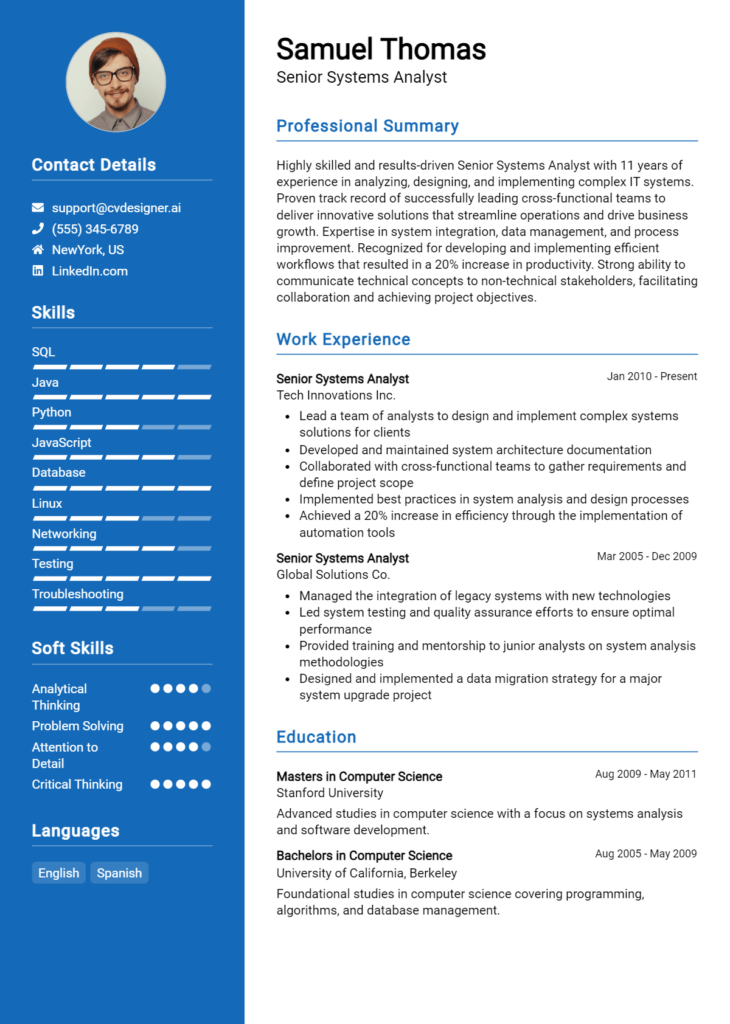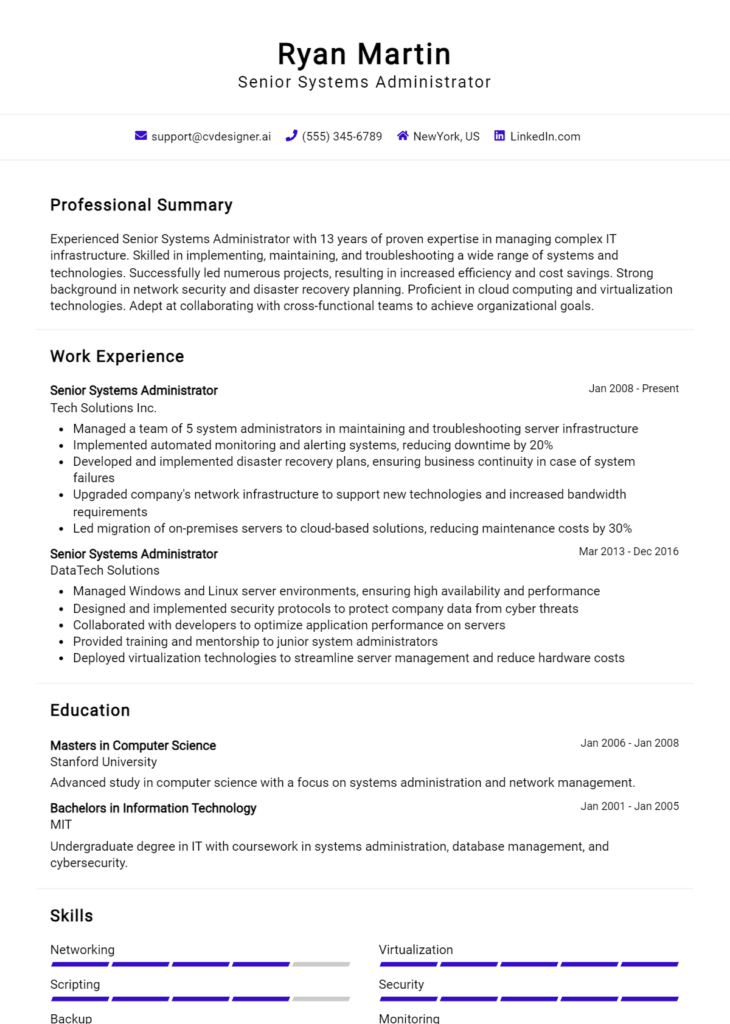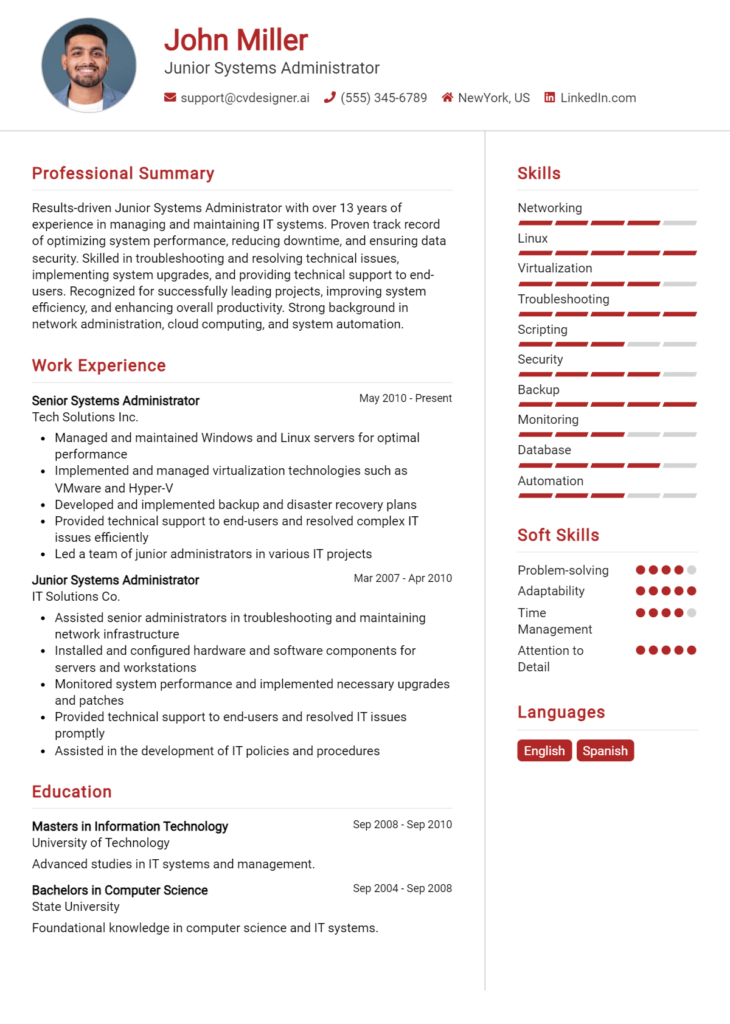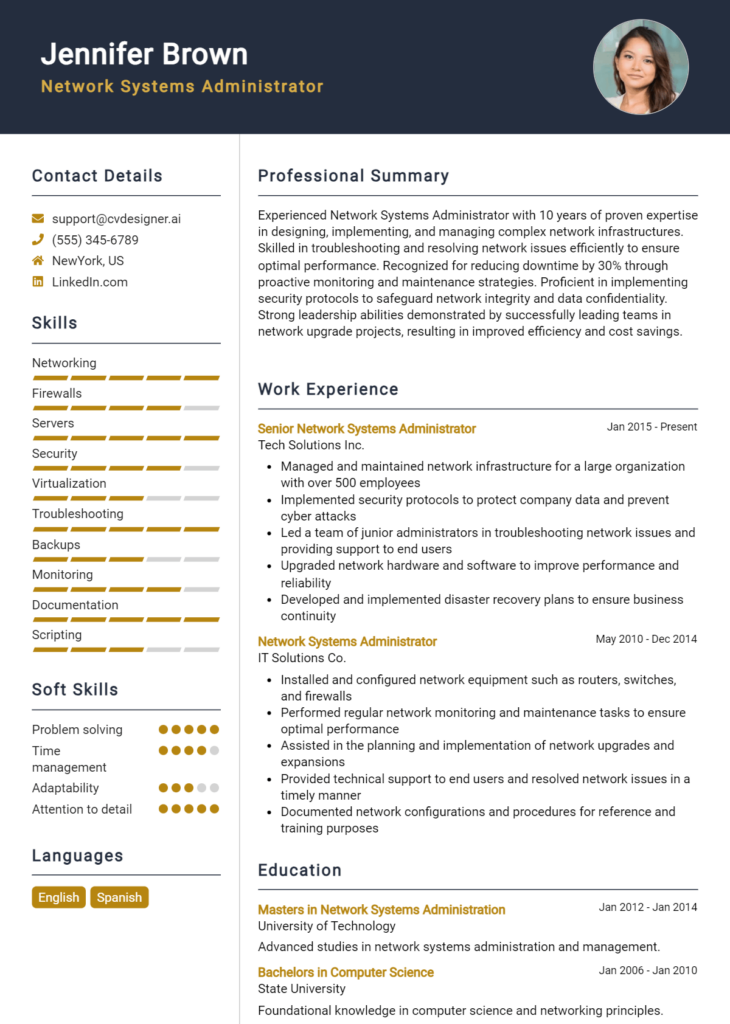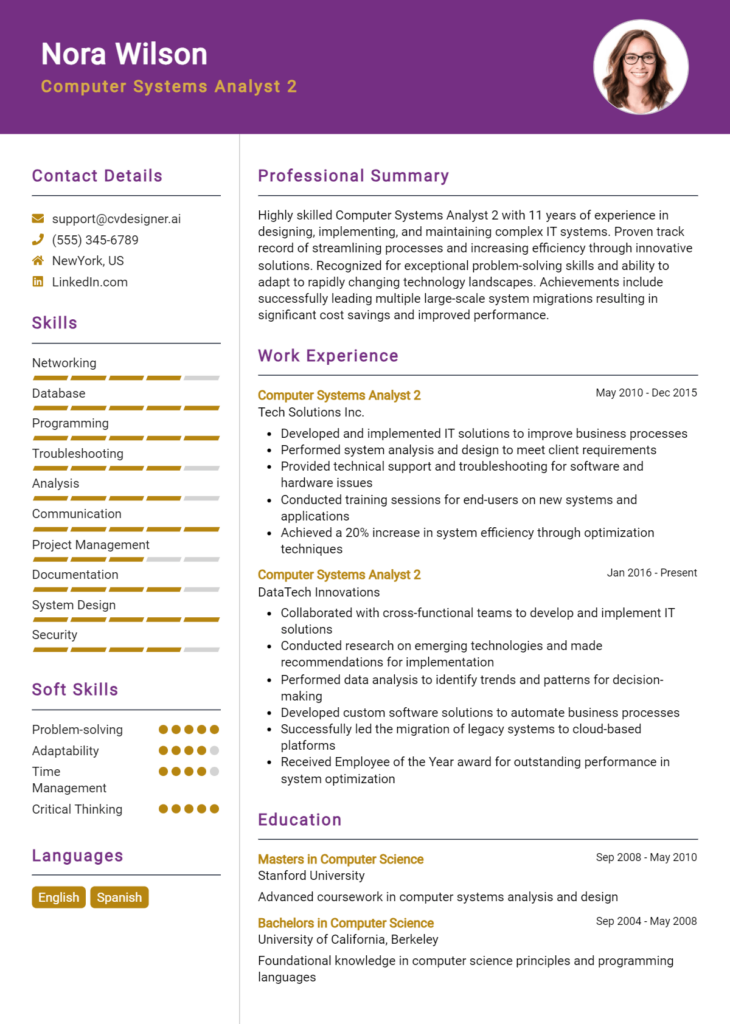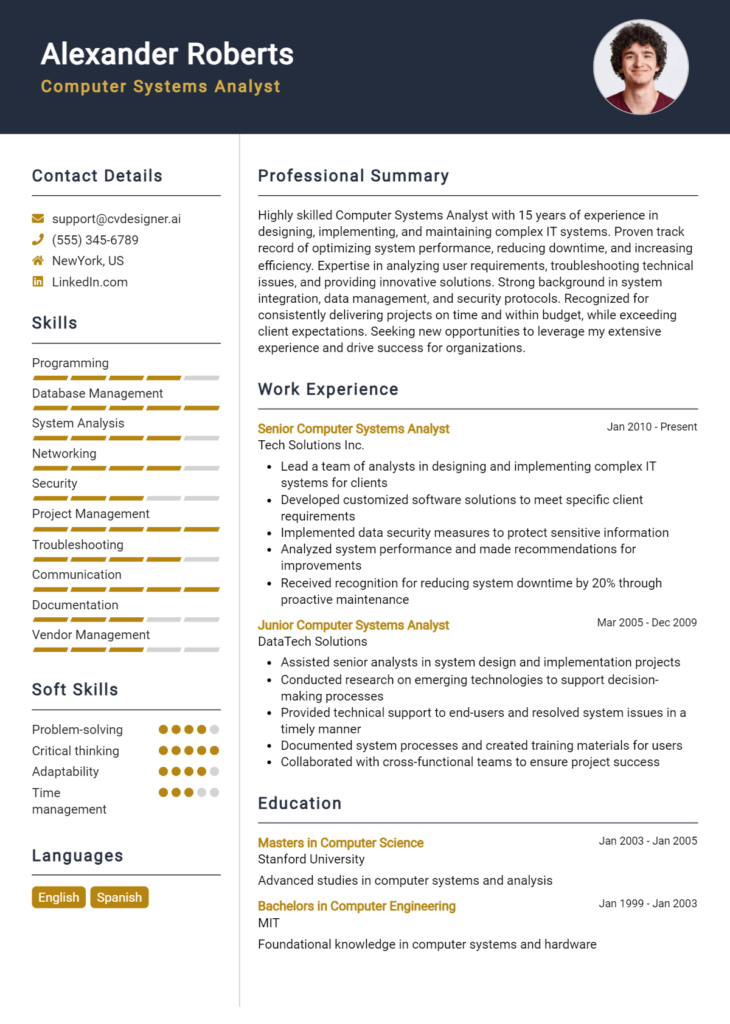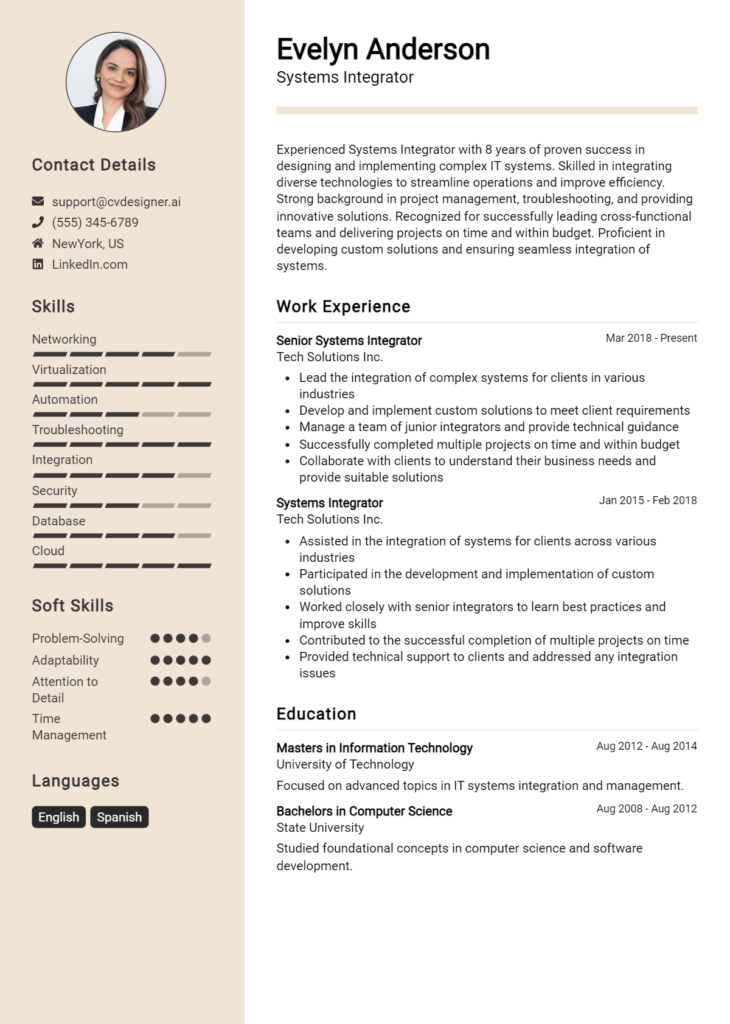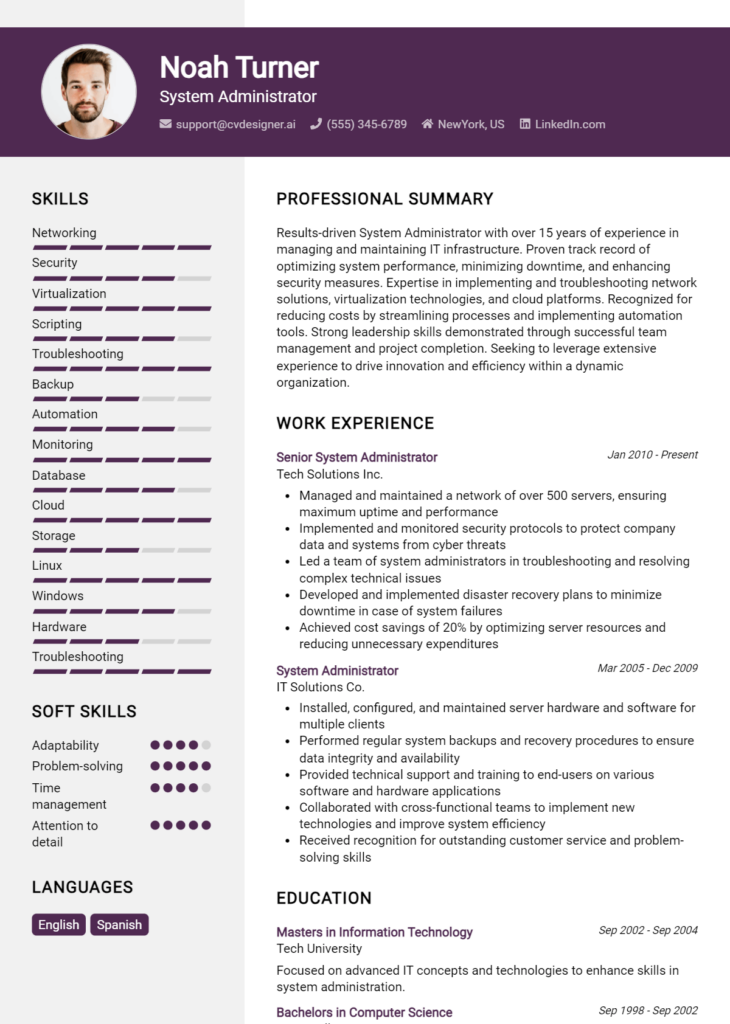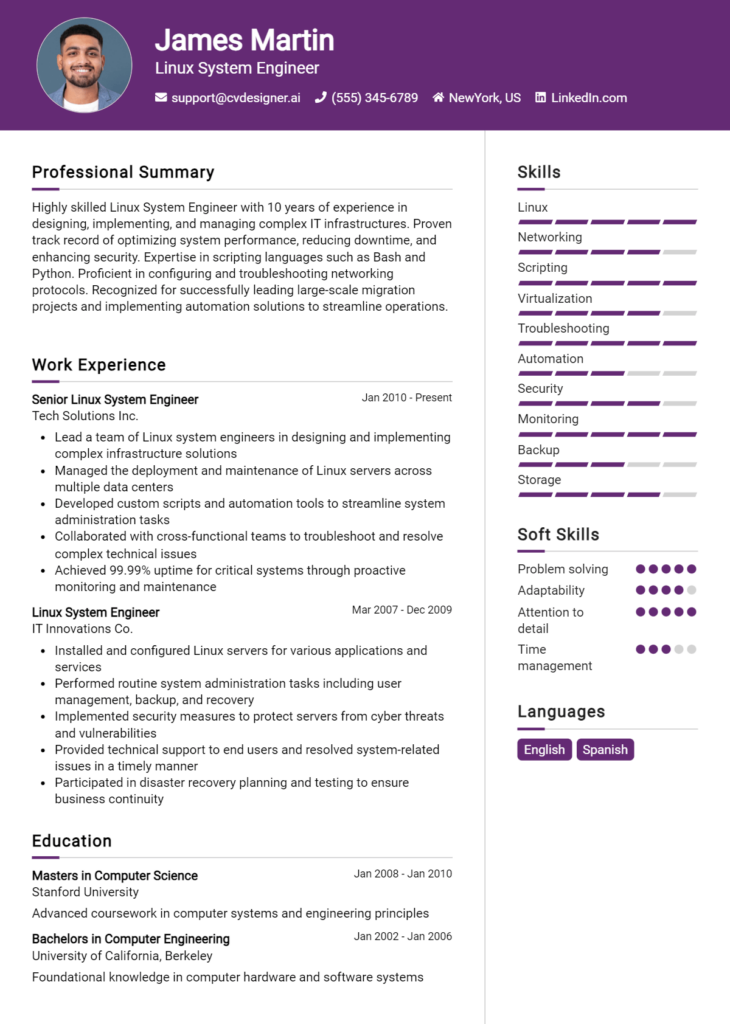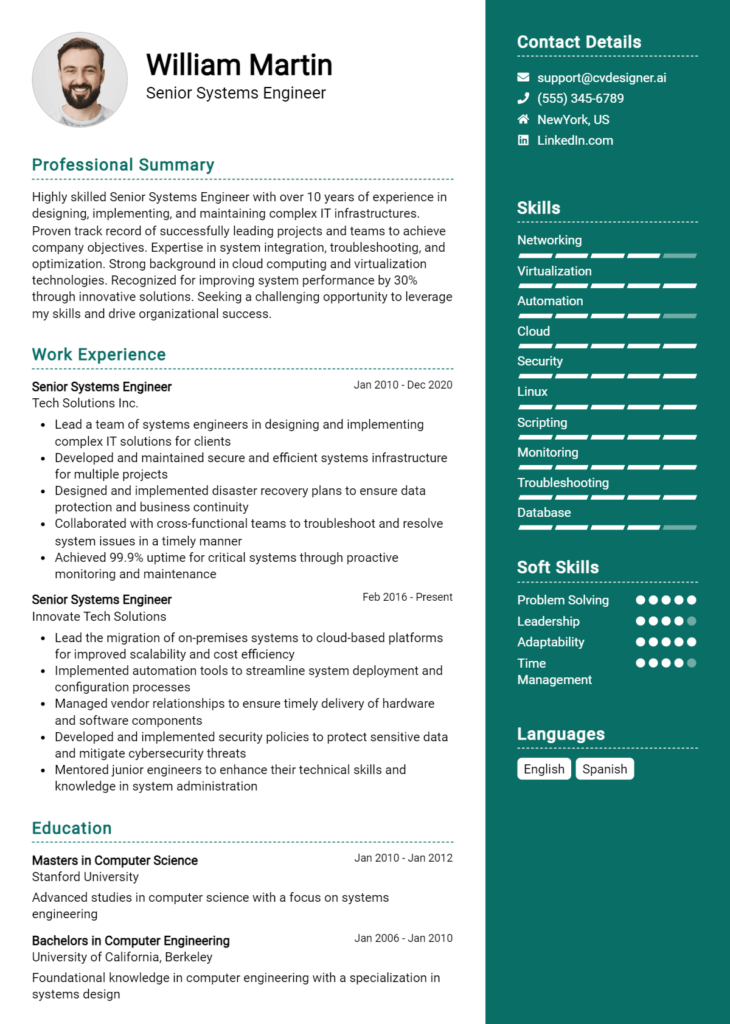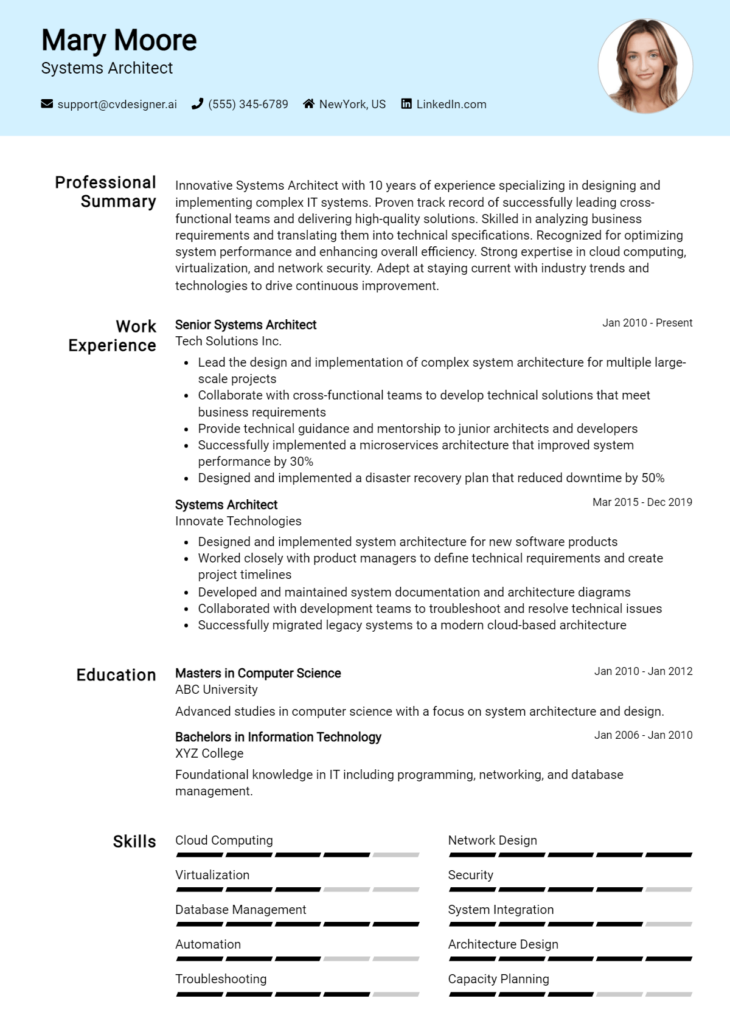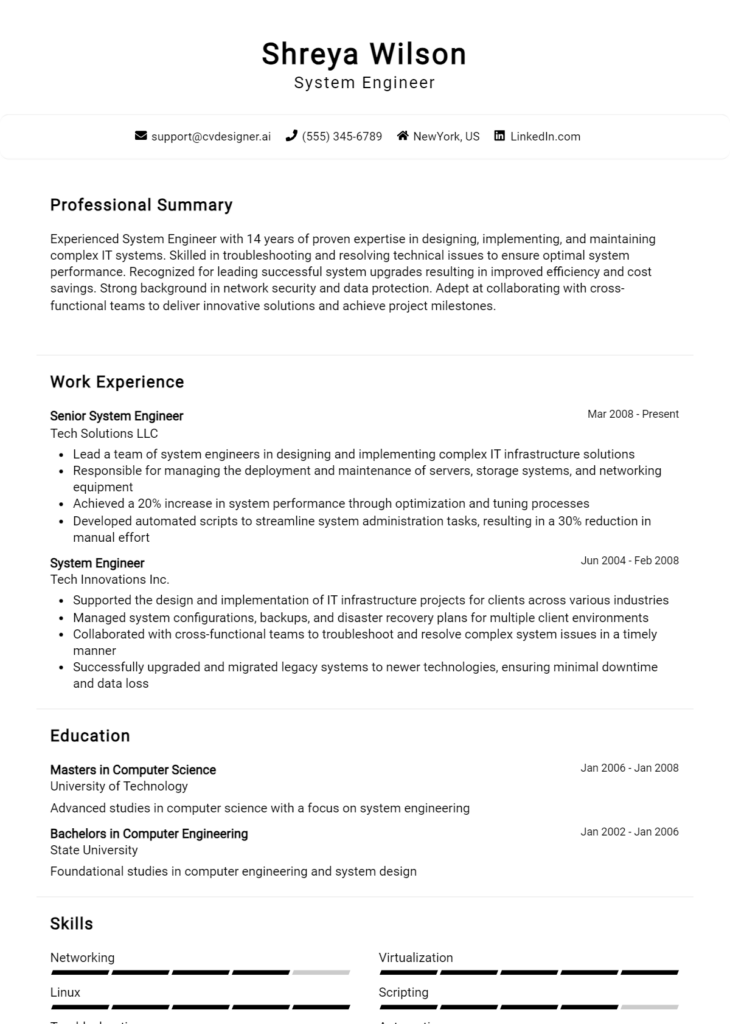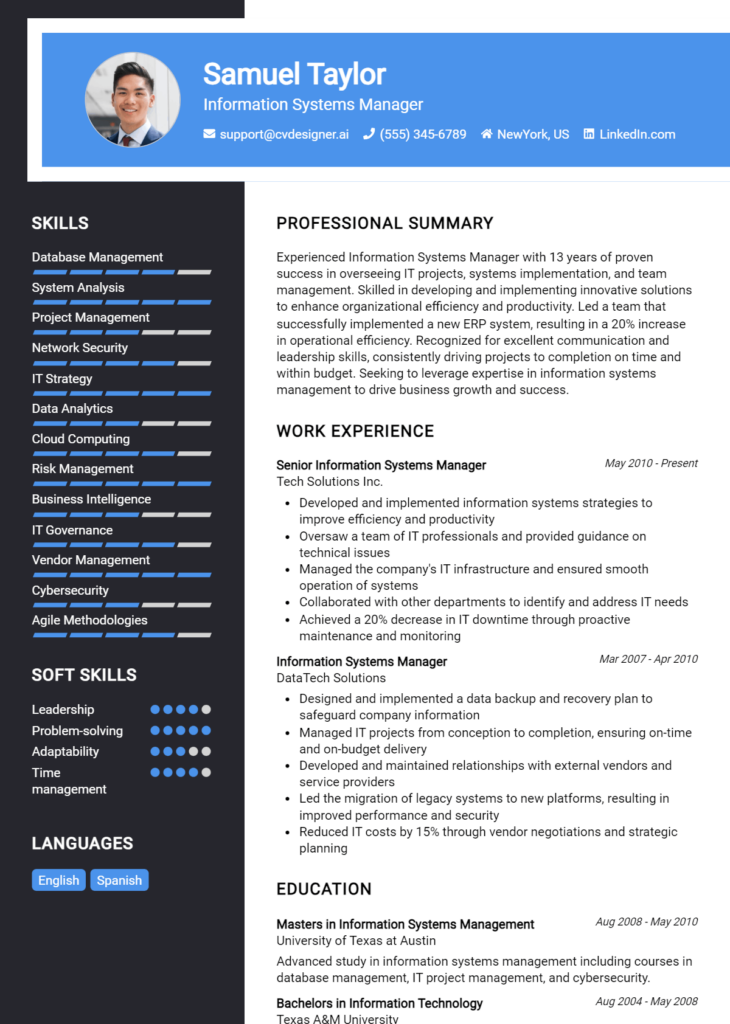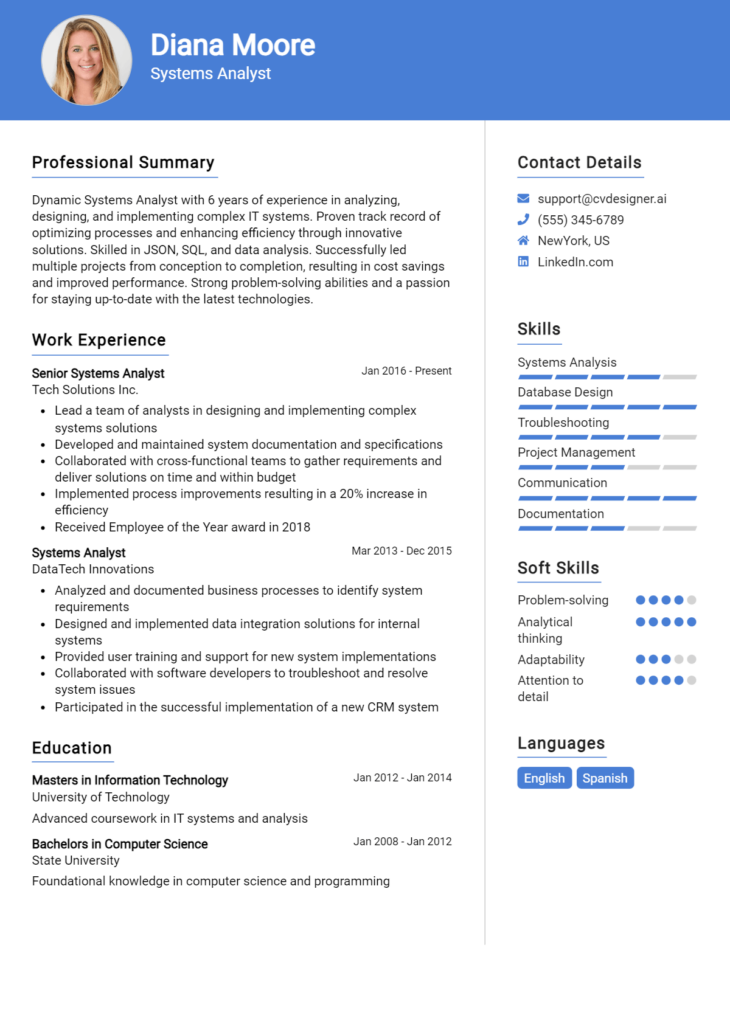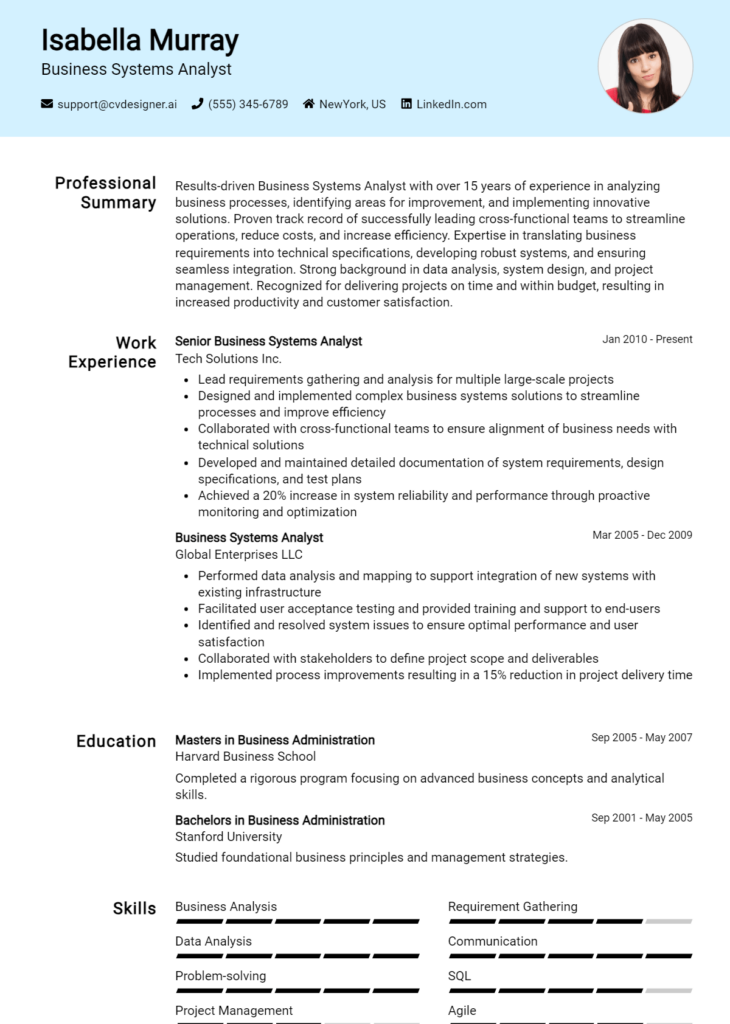Most Popular Systems Programmer Resume Examples
Explore additional Systems Programmer resume samples and guides and see what works for your level of experience or role.
As the backbone of software applications and system functionality, a Systems Programmer plays a critical role in ensuring that computer systems operate efficiently and effectively. This position requires a unique blend of programming skills, problem-solving abilities, and an in-depth understanding of both hardware and software systems. Given the technical nature of the role, having a well-crafted resume is paramount to standing out in a competitive job market. A strong resume not only showcases your technical expertise and accomplishments but also reflects your professionalism and attention to detail, which are essential traits for any Systems Programmer.
In this comprehensive resume writing guide, we will delve into the essential components of creating a standout resume tailored specifically for Systems Programmers. Key topics include an overview of the responsibilities and skills pertinent to this role, advice on the best resume format to use, and common pitfalls to avoid when crafting your resume. We will also provide resume examples for all levels, from entry-level positions to seasoned professionals, along with actionable tips on effective resume writing. Additionally, you'll find guidance on selecting the right resume templates that can enhance your application’s visual appeal and clarity, ensuring your qualifications shine through. Whether you’re just starting your career or looking to advance, this guide will equip you with the tools you need to create a compelling Systems Programmer resume.
Key Responsibilities and Skills for a Systems Programmer
A Systems Programmer plays a crucial role in developing and maintaining the software that operates computer systems and networks. They are responsible for designing, coding, testing, and debugging operating systems and system-level software. This position requires a deep understanding of hardware and software interactions, along with a strong analytical mindset.
Key Responsibilities:
- Develop and maintain system-level software, including operating systems and firmware.
- Optimize system performance, ensuring efficient resource allocation and management.
- Troubleshoot and resolve system-related issues, providing timely support to users and stakeholders.
- Write and maintain documentation for system processes and software functionalities.
- Collaborate with cross-functional teams to integrate software solutions with existing systems.
- Conduct system testing and validation to ensure reliability and security.
Essential Skills:
- Proficiency in programming languages such as C, C++, and assembly language.
- Strong understanding of operating systems concepts and architecture.
- Experience with system debugging tools and performance monitoring.
- Familiarity with hardware interfaces and system architecture.
- Knowledge of network protocols and security practices.
- Excellent problem-solving and analytical skills.
- Strong communication and teamwork abilities.
Highlighting these skills effectively in the resume skills section is vital for standing out to potential employers. Tailoring your responsibilities and skills to align with the specific job description can significantly enhance your chances of being noticed. Additionally, consider how these skills could be relevant in creating a strong CV, showcasing not only your technical capabilities but also your ability to contribute to the organization's goals.
Best Resume Format and Structure for a Systems Programmer
When crafting a resume for a Systems Programmer position, it's crucial to choose a format that effectively showcases your technical skills, work experience, and educational background. Below is a detailed guide on the best resume format and structure for a Systems Programmer.
Contact Information
- Name: Your full name should be prominently displayed at the top of the resume.
- Phone Number: Include a reliable phone number for potential employers to reach you.
- Email Address: Use a professional email address. Avoid nicknames or unprofessional domains.
- LinkedIn Profile: Include a link to your LinkedIn profile if it reflects your professional experience and skills.
- Location: You may include your city and state, but it's not necessary to provide a full address.
Professional Summary
- Write a brief, impactful summary (2-3 sentences) highlighting your experience, key skills, and what you bring to the role of a Systems Programmer. Tailor this section to align with the job description.
- Example: "Detail-oriented Systems Programmer with over 5 years of experience in designing, coding, testing, and maintaining system software. Proficient in C/C++, Java, and Python, with a strong focus on performance optimization and system security."
Work Experience
- List your work experience in reverse chronological order, starting with your most recent position.
- Include the following for each position:
- Job Title: Clearly state your role.
- Company Name and Location: Provide the name of the company and its location.
- Dates of Employment: Include the month and year of your employment duration.
- Responsibilities and Achievements: Use bullet points to outline your main responsibilities and any significant achievements. Focus on quantifiable results, such as performance improvements or successful projects.
- Example:
- Systems Programmer
XYZ Technologies, San Francisco, CA
June 2020 – Present- Developed and maintained system software that improved processing speeds by 30%.
- Collaborated with a team of engineers to implement a new security protocol, reducing vulnerabilities by 50%.
Education
- List your educational qualifications in reverse chronological order, starting with the most recent degree.
- Include:
- Degree Earned: e.g., Bachelor of Science in Computer Science.
- Institution Name: The name of the university or college.
- Location: City and state of the institution.
- Graduation Date: Month and year of graduation.
- Example:
- Bachelor of Science in Computer Science
University of California, Berkeley, CA
Graduated: May 2018
Skills
- Create a section dedicated to your technical skills. Use bullet points or a comma-separated list.
- Focus on specific programming languages, tools, and technologies relevant to systems programming, such as:
- Programming Languages: C, C++, Java, Python
- Operating Systems: Linux, Unix, Windows
- Tools: Git, Docker, Jenkins
- Other: System Architecture, Network Protocols, Performance Tuning
Certifications
- If you have relevant certifications, list them in this section. Include:
- Certification Name: e.g., Certified Systems Programmer (CSP).
- Issuing Organization: The name of the organization that issued the certification.
- Date Earned: Month and year of certification.
- Example:
- Certified Systems Programmer (CSP)
International Association of Systems Programmers
Earned: March 2021
Formatting Tips
- Font and Size: Use a professional font (e.g., Arial, Calibri) in 10-12 point size for readability.
- Consistency: Ensure consistent formatting throughout (e.g., bullet points, alignment).
- Length: Aim for a one-page resume, especially if you have less than 10 years of experience. More experienced candidates may extend to two pages.
- White Space: Use adequate white space to keep the document uncluttered and easy to read.
Complementing Cover Letter Format
The resume format you choose should complement the format of your cover letter. Use the same font styles, sizes, and colors in both documents to maintain a cohesive appearance. Your cover letter should further elaborate on the achievements listed in your resume, highlighting your passion for systems programming and how your experience aligns with the organization's goals. This comprehensive approach enhances your professional presentation and makes a compelling case for your candidacy.
Writing Tips and Best Practices for a Systems Programmer Resume
When crafting a resume as a Systems Programmer, it's essential to highlight your technical skills and problem-solving abilities while presenting your experience clearly and concisely. Focus on showcasing your contributions to projects and the impact of your work, as hiring managers seek candidates who can demonstrate tangible results. Tailoring your resume to the specific job description and utilizing resume writing tips can significantly enhance its professionalism. Keep in mind that these practices are equally valuable when drafting a cover letter, allowing you to present a cohesive narrative of your qualifications.
- Use strong action verbs such as "developed," "optimized," and "implemented" to begin bullet points, emphasizing your active role in projects.
- Quantify your achievements where possible, such as "reduced system downtime by 30%" or "enhanced application performance by 25%."
- Incorporate industry-specific keywords from the job description to pass through Applicant Tracking Systems (ATS) and catch the attention of hiring managers.
- Keep your formatting clean and professional, using consistent fonts and bullet points for easy readability.
- Highlight relevant certifications or programming languages (e.g., Java, Python, C++) prominently to showcase your technical expertise.
- Tailor your experience section to focus on relevant projects, emphasizing your role in team collaboration and individual contributions.
- Include a summary or objective statement that clearly articulates your career goals and what you bring to the table as a Systems Programmer.
- Proofread your resume thoroughly to eliminate any typos or grammatical errors, ensuring it reflects your attention to detail and professionalism.
Common Mistakes to Avoid in a Systems Programmer Resume
When crafting a resume as a Systems Programmer, it's crucial to present your qualifications and experience effectively. However, many candidates make common mistakes that can detract from their overall appeal. A well-structured resume should highlight your skills without overwhelming the reader with unnecessary information or vague descriptions. To enhance your chances of landing an interview, be mindful of the following pitfalls to avoid in your Systems Programmer resume:
- Overloading the resume with excessive technical jargon that may confuse the reader.
- Using generic descriptions for job roles, rather than detailing specific responsibilities and achievements.
- Failing to tailor the resume to the job description, missing out on relevant keywords and skills.
- Listing outdated or irrelevant technologies that do not pertain to the current job market.
- Ignoring the importance of formatting, resulting in a cluttered or hard-to-read document.
- Neglecting to quantify achievements, such as improvements in system performance or successful project completions.
- Using an unprofessional email address or inappropriate contact information.
- Including unnecessary personal details, such as marital status or age, which are not relevant to the job.
- Overlooking proofreading, leading to typos and grammatical errors that undermine professionalism.
- Not providing a clear summary or objective statement that outlines career goals and aspirations.
To avoid these errors and create a compelling resume, consider reviewing the common mistakes to avoid in a resume. Additionally, don’t forget to check for common cover letter mistakes that could hinder your overall application.
Sample Systems Programmer Resumes
As a Systems Programmer, you play a crucial role in developing, maintaining, and optimizing software systems that ensure smooth and efficient operations within an organization. Whether you're an experienced professional, an entry-level candidate, or someone transitioning from another career, having a well-crafted resume is essential to showcase your skills and qualifications. Below are three sample resumes tailored to different experience levels and career paths for a Systems Programmer.
Experienced Professional Resume Sample
John Doe
1234 Maple Lane
Anytown, USA 12345
(555) 123-4567
johndoe@email.com
Professional Summary
Results-driven Systems Programmer with over 8 years of experience in system software development and maintenance. Proficient in multiple programming languages, including C++, Java, and Python. Demonstrated ability to optimize existing systems and implement new software solutions to enhance operational efficiency.
Technical Skills
- Programming Languages: C++, Java, Python, Assembly
- Operating Systems: Linux, Windows, UNIX
- Database Management: SQL, Oracle
- Tools: Git, Docker, Jenkins
Professional Experience
Systems Programmer
XYZ Technologies, Anytown, USA
June 2018 - Present
- Developed and optimized system software for enterprise-level applications, resulting in a 30% increase in performance efficiency.
- Collaborated with cross-functional teams to design and implement new features based on user requirements.
- Conducted system testing and debugging, reducing software defects by 25%.
Junior Systems Programmer
ABC Corp, Anytown, USA
August 2015 - May 2018
- Assisted in the development and maintenance of software applications, ensuring adherence to coding standards.
- Performed regular system updates and security checks, enhancing system reliability.
- Documented software specifications and user manuals for internal use.
Education
Bachelor of Science in Computer Science
State University, Anytown, USA
Graduated: May 2015
Entry-Level Candidate Resume Sample
Jane Smith
5678 Oak Drive
Anytown, USA 12345
(555) 987-6543
janesmith@email.com
Objective
Motivated and detail-oriented recent graduate seeking an entry-level Systems Programmer position to leverage programming skills and contribute to software development projects.
Technical Skills
- Programming Languages: Java, Python, C#
- Operating Systems: Linux, Windows
- Database Management: MySQL
- Tools: Git, Visual Studio
Education
Bachelor of Science in Computer Science
State University, Anytown, USA
Graduated: May 2023
Internship Experience
Software Development Intern
Tech Innovations, Anytown, USA
June 2022 - August 2022
- Assisted in the development of a web application using Java and Spring Boot.
- Collaborated with senior developers to troubleshoot and resolve system bugs.
- Participated in code reviews, gaining hands-on experience with version control systems.
Projects
Personal Portfolio Website
- Developed a responsive personal portfolio website using HTML, CSS, and JavaScript to showcase programming projects and skills.
Career Changer Resume Sample
Michael Johnson
9101 Pine Road
Anytown, USA 12345
(555) 654-3210
michaeljohnson@email.com
Summary
Dedicated professional transitioning from a background in network administration to a Systems Programmer role. Strong problem-solving skills and a solid understanding of software development principles, eager to apply technical expertise in a new capacity.
Technical Skills
- Programming Languages: Python, JavaScript, SQL
- Networking: TCP/IP, Firewalls, Routers
- Operating Systems: Windows, Linux
- Tools: Git, Ansible
Professional Experience
Network Administrator
Network Solutions, Anytown, USA
January 2018 - Present
- Managed and optimized network infrastructure for a mid-sized organization, improving uptime by 20%.
- Developed scripts in Python to automate routine network tasks, enhancing efficiency.
- Provided technical support and training to staff on network-related software.
Education
Certificate in Software Development
Online Coding Bootcamp
Completed: August 2023
Projects
Network Monitoring Tool
- Created a network monitoring tool using Python and SQL to track bandwidth usage and generate reports for analysis.
For more inspiration, feel free to explore additional resume templates. Don't forget to complement your resume with corresponding cover letter examples to create a complete job application package.
Checklist for a Systems Programmer Resume
- Proofread for Typos and Errors: Carefully read through your resume multiple times to catch any spelling or grammatical errors. Consider using grammar-checking software or tools for additional support.
- Consistent Formatting: Ensure that your font, bullet points, and spacing are consistent throughout the document. Use the same font size and style for similar sections to maintain a professional appearance.
- Tailor Your Content: Customize your resume for each job application by highlighting relevant skills and experiences that align with the specific requirements of the Systems Programmer role you are applying for.
- Use Action Verbs: Start bullet points with strong action verbs (e.g., developed, implemented, optimized) to convey your accomplishments more effectively and make your contributions stand out.
- Quantify Achievements: Whenever possible, include quantifiable metrics to demonstrate your impact. For example, mention specific improvements in system performance or reductions in downtime.
- Highlight Relevant Skills: Clearly list technical skills relevant to systems programming, such as knowledge of programming languages, operating systems, and debugging tools. Ensure these are prominently featured in your resume.
- Include Keywords: Incorporate keywords from the job description to pass through Applicant Tracking Systems (ATS) and catch the attention of hiring managers.
- Professional Summary: Write a concise professional summary at the top of your resume that captures your qualifications and career objectives, tailored to systems programming.
- Keep It Concise: Limit your resume to one or two pages, focusing on the most relevant experience and skills. Remove any unrelated or outdated information.
- Consider AI Resume Builders: Use an AI resume builder to help structure and organize your resume effectively, ensuring that all elements are well-presented.
A similar checklist can also be followed for creating a CV or cover letter.
Key Takeaways for a Systems Programmer Resume Guide
As you prepare to create your Systems Programmer resume, remember that a well-structured and tailored document can significantly enhance your chances of landing an interview. Utilize the examples and tips provided in this guide to highlight your technical skills, relevant experience, and accomplishments effectively. To take the next step in your job application journey, consider downloading a resume template from resume templates, or explore our cover letter templates to complement your application. You can also leverage our best resume maker for a user-friendly experience in crafting your resume. By adhering to these guidelines, you will not only build a strong resume but also create a compelling CV and cover letter that stand out to potential employers. Start today and take a significant step toward your career goals!
